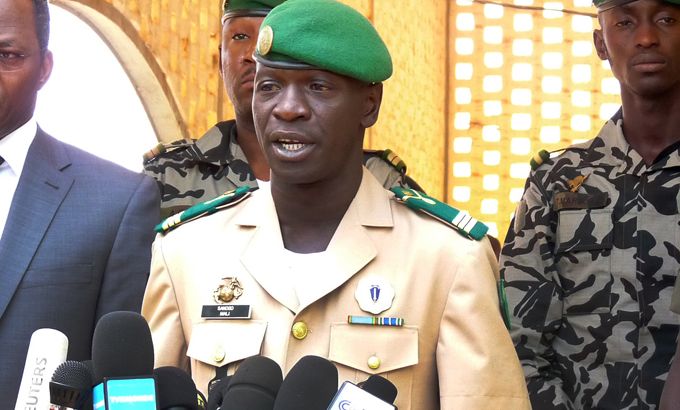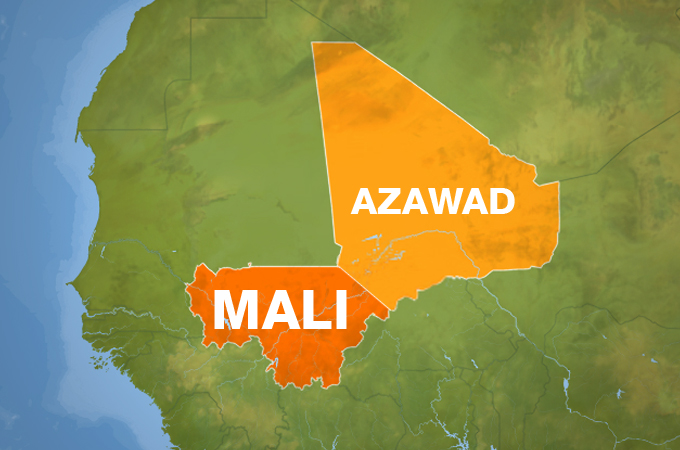Mali junta says power transfer ‘within days’
Coup leaders agree in a deal with ECOWAS for a return to constitutional rule under an interim leader.

The leaders of Mali’s coup and neighbouring countries have reached a deal under which the two-week-old military junta will hand over power in return for the end of trade and diplomatic sanctions.
Mali’s military junta and the Economic Community of West African States (ECOWAS) bloc announced the deal on Malian state television late on Friday.
Under the plan, signed by mediators and junta leader Captain Amadou Sanogo, the military government will hand over power to parliament speaker Diouncounda Traore who will be sworn in as interim president with a mission to organise elections.
Sanogo said the new prime minister and a national unity government will be put in place “in the next few days”.
Traore arrived from neighbouring Burkina Faso, where he had been when the coup had taken place, late on Saturday night.
“I am leaving for Mali with my heart full of hope. My country has known enormous difficulties, but I am leaving with the hope the people of Mali will come together to face this adversity head on,” Traore told reporters before he boarded the plane for Bamako, the Malian capital.
The deal, hailed by the African Union, also includes the lifting of sanctions clamped by ECOWAS on Mali and an amnesty for those involved in the coup.
The embargo included the closing of all borders of ECOWAS states with Mali except for humanitarian reasons, closing to Mali access to ECOWAS ports, and the freezing of Malian bank accounts.
Sanctions will be lifted
Alassane Ouattara, the president of the Ivory Coast who currently holds the rotating ECOWAS presidency, said the sanctions should be lifted “immediately”, Burkina Faso Foreign Minister Djibrill Bassole told public television station ORTM.
Bassole has been acting as a mediator during the crisis.
He also said President Amadou Toumani Toure, who was overthrown on March 22 and has since not been seen in public, should be able to live where he wants under army protection.
The five-page agreement provides a framework for a return to constitutional rule under the interim leader who will also handle the crisis in the north, where Islamists and Tuareg rebels have seized control.
The deal did not give a timetable for Sanogo to step down, but said the 15-state ECOWAS regional grouping would immediately prepare the end of tough sanctions including the closure of trade borders to the land-locked country.
The statement added that if elections were not possible within the 40 days set out by the constitution due to Tuaregs’ rebellion in the north, a transition structure would need to be created.
Rebellion in north
 |
The announcement came on the day that the northern rebels declared independence of the territory they call Azawad, a call immediately rejected by African neighbours and foreign capitals from Paris to Washington.
Bassole said that if the transition government and the rebels agree to a ceasefire, then ECOWAS forces would be deployed to monitor it, Al Jazeera’s Hashem Ahelbarra reported from Bamako, the Malian capital.
If a ceasefire is not agreed to, however, ECOWAS forces will fight alongside the Malian miltiary to take on the Tuareg rebels, Bassole said.
It would take ECOWAS forces three months to prepare for deployment, sources told Al Jazeera.
“The ECOWAS made it quite clear to all different parties that they would like to engage all the factions – Ansar-ud-din and also the National Movement for the Liberation of Azawad (MNLA) and all the Tuareg – for a dialogue. But if that dialogue fails, then they will send troops to fight alongside the Malian army to regain control of those areas,” reported Al Jazeera’s Ahaelbarra.
Sanogo, however, indicated that the Malian military was seeking logistical support, rather than the deployment of foreign forces.
“The Malian army still needs help precisely on logistics and air support but not ground troops to help us solve the security problem in northern Mali,” said Sanogo.
“We have to sit and talk. If they want to help us it should be according to our needs,” he added.
Ahelbarra reported that the coup’s leaders had been seeking guarantees of immunity from prosecution, and also of additional assistance being provided to the country’s military to fight the Tuareg rebels.
“That issue is going to definitely be addressed by the international community. They say they will help train and equip the Malian army and they will provide it with all sorts of assistance [including intelligence, air force assistance and troop assistance],” he said.
The military chief of the Ansar-ud-din group in the rebel-held north, meanwhile, said that his group was fighting “a legal war in the name of Islam”, rejecting the MNLA’s declaration that it would cease hostilities if the independence of what they call their homeland, Azawad, is recognised.
Amnesty International has warned of a brewing humanitarian crisis in the northern towns of Gao, Kidal and Timbuktu.
“The population is at imminent risk of severe food and medical shortages that could lead to many casualties, especially among women and children who are less able to fend for themselves,” said Gaetan Mootoo, Amnesty’s West Africa researcher.